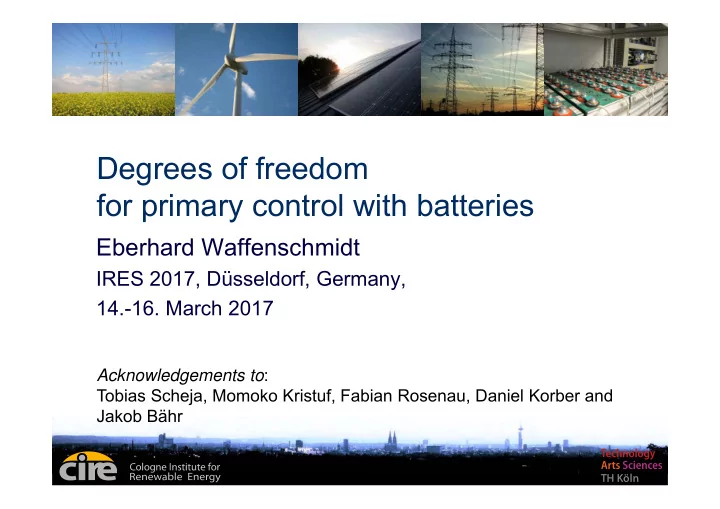

Degrees of freedom for primary control with batteries Eberhard Waffenschmidt IRES 2017, Düsseldorf, Germany, 14.-16. March 2017 Acknowledgements to : Tobias Scheja, Momoko Kristuf, Fabian Rosenau, Daniel Korber and Jakob Bähr TH Köln TH Köln
Generators replaced by electronics S.2 TH Köln TH Köln
Primary control with batteries 3 TH Köln TH Köln
Occurrence of Primary Control Power in 2013 4 TH Köln TH Köln
State of charge without measures Strong depletion due to State of Charge / MWh Charging losses Imperfect frequency measurements 5 TH Köln TH Köln
Degrees of freedom with Primary Control 150% Optional 120% excess 100% power Feed-in power P/Pmax 50% Nominal power 0% -50% -100% -120% -150% 49.7 49.8 49.9 50 50.1 50.2 50.3 Frequency f / Hz 6 TH Köln TH Köln
Degrees of freedom with Primary Control 150% Additional degrees of Optional Optional deadband freedom: 120% excess 100% Delayed reaction: power 50.01 30s to full power Feed-in power P/Pmax 50% 49.99 Hz Trading of energy Nominal power 0% -50% -100% -120% -150% 49.7 49.8 49.9 50 50.1 50.2 50.3 Frequency f / Hz 7 TH Köln TH Köln
Effect of applying degrees of freedom State of Charge / MWh Dead band No strategy 8 TH Köln TH Köln
Effect of applying degrees of freedom State of Charge / MWh Excess delivery Dead band No strategy 9 TH Köln TH Köln
Effect of applying degrees of freedom State of Charge / MWh Excess Dead band delivery and excess Dead band No strategy 10 TH Köln TH Köln
Degrees of freedom with Primary Control 150% Additional degrees of Optional Optional deadband freedom: 120% excess 100% Delayed reaction: power 50.01 30s to full power Feed-in power P/Pmax 50% 49.99 Hz Trading of energy Nominal power 0% -50% ±10mHz -100% -120% Measurement preciseness -150% 49.7 49.8 49.9 50 50.1 50.2 50.3 Frequency f / Hz 11 TH Köln TH Köln
Effect of a systematic frequency error Allowed frequency Energy is missing for one year measurement error: 500 +/-450 MWh missing 400 Missing Energy E / MWh To achieve missing 300 energy <1MWh: 200 Preciseness required 100 +/-0.023mHz 0 -100 -200 -300 -400 -500 -10 -8 -6 -4 -2 0 2 4 6 8 10 Measurement error f /mHz TH Köln TH Köln
The idea: Compensate error by averaging Frequency Nominal measurement frequency Power slope 50,000Hz Memory f corr P f f f n f avg (i) +1 f avg (i-1) P set n Weighting factor P grid P bat Power Battery Power grid converter storage 13 TH Köln TH Köln
Effect of applying degrees of freedom Frequency averaging All State of Charge / MWh Excess Dead band delivery and excess Dead band No strategy 14 TH Köln TH Köln
Conclusion 15 TH Köln TH Köln
Primary control with batteries Problem : Strong depletion due to Charging losses Imprecise frequency measurements Solution : Use degrees of freedom Excess delivery Deadtime Frequency: Averaging 16 TH Köln TH Köln
Contact Prof. Dr. Eberhard Waffenschmidt Electrical Grids, CIRE - Cologne Institute for Renewable Energy Betzdorferstraße 2, Room ZO 9-19 50679 Cologne, Germany Tel. +49 221 8275 2020 eberhard.waffenschmidt@th-koeln.de https://www.fh-koeln.de/personen/eberhard.waffenschmidt/ and www.100pro-erneuerbare.com 17 TH Köln TH Köln
Recommend
More recommend